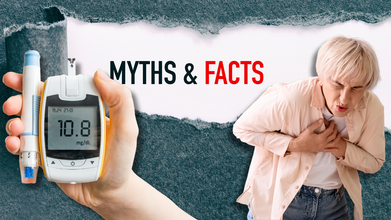- Health Conditions A-Z
- Health & Wellness
- Nutrition
- Fitness
- Health News
- Ayurveda
- Videos
- Medicine A-Z
- Parenting
- Web Stories
Magnesium For Sleep: Do These Popular Supplements Really Work or Pose Hidden Risks?

Credits: Canva
If you often find yourself tossing in bed or staring at the ceiling at 3 a.m., you might be wondering whether magnesium, the mineral known for promoting calm and relaxation, could be the key to better sleep. It may be worth exploring, especially if your body lacks enough of it, says Denise M. Millstine, M.D., assistant professor of medicine and director of integrative medicine and health at Mayo Clinic in Arizona.
Those most at risk of magnesium deficiency include women, older adults, people who drink alcohol regularly, and anyone whose diet relies heavily on processed or convenience foods.
So, does magnesium truly live up to the hype? It’s certainly trending. According to Growth Market Reports, sales of topical magnesium products reached $421.6 million in 2023, while Grand View Research valued the magnesium supplement market at $29.3 million in 2024.
What Are Magnesium Supplements?
Magnesium supports over 300 essential body functions and plays a major role in healthy aging. Still, the belief that it can be a hidden cure-all deserves a closer look. To separate science from speculation, let’s examine two widely circulated claims on social media: that magnesium guarantees better sleep, and that it can ease anxiety or depression.
How Magnesium May Help With Sleep
Magnesium helps regulate several processes in the body, including the balance of neurotransmitters, the chemicals that allow nerve cells to communicate, Dr Millstine explains. These messengers influence mood, sleep, memory, and muscle control.
“Some neurotransmitters stimulate, while others calm,” she says. “Magnesium helps maintain balance between the two.” If you struggle with anxiety or racing thoughts at bedtime, magnesium might help tilt the scale toward the calming side, making it easier to drift off.
Dr Millstine adds that people with “busy minds” may notice the most improvement. “Some individuals can suppress their anxious thoughts during the day, but when night falls, their minds grow louder and harder to quiet,” she explains.
Can Taking Magnesium Have Side Effects?
Experts do not advise magnesium supplements for people who aren’t deficient in the mineral.
While generally safe, it’s best to consult a doctor before adding magnesium to your routine, especially if you have existing health issues. The supplement may not be suitable for those taking certain diuretics, antibiotics, or heart medications.
Most users experience no side effects, though high doses can lead to digestive problems. Possible reactions include:
- Diarrhea
- Nausea
- Vomiting
People with kidney problems are more vulnerable to magnesium toxicity, as their bodies may struggle to clear excess amounts.
How Much Magnesium Should You Take?
The ideal magnesium dosage ranges between 200 and 400 mg daily, depending on the product. This typically provides the full recommended daily intake.
According to Healthline, the safe upper limit for magnesium supplements is 350 mg per day. Staying within this range helps reduce the risk of digestive discomfort and other side effects.
This article is intended for general informational purposes only and should not be taken as medical advice. Always consult your doctor or a qualified healthcare professional before starting any supplement or treatment.
NHS Issues New Warning On Tramadol, Long-Term Use May Trigger THIS Health Condition

Credits: Canva
Tramadol, part of the opioid class, is commonly prescribed for moderate to severe pain, such as after an injury or surgery. Because of its potency and ability to manage pain effectively, doctors may turn to tramadol when other pain relievers fail. It is usually available as a tablet or capsule, but can also be given as a liquid or injection, the latter often used in hospital settings.
In certain cases, ongoing tramadol use may be necessary, especially for those living with chronic pain conditions. While it can be essential for daily pain management, it is important to be aware that prolonged use may increase the risk of unwanted side effects.
What is Tramadol?
Tramadol is a dual-action opioid that affects serotonin and norepinephrine pathways, often described as a middle-ground painkiller, stronger than non-opioid medications but thought to be less addictive than morphine. It is prescribed for moderate-to-severe pain, including both post-surgical discomfort and long-term chronic conditions.
Globally, prescriptions have surged, partly because of the perception that tramadol is safer and carries a lower risk of dependence compared with stronger opioids.
Tramadol Side Effects: Dangers of Taking Tramadol Over A Long-Term Period
Hyperalgesia
The NHS has warned about the risks of long-term tramadol use, including hyperalgesia. This condition can make you more sensitive to pain, so that ordinary aches feel much stronger or more intense than usual. If this occurs, your doctor may recommend gradually reducing the tramadol dose to help ease these heightened sensations.
Tolerance
Over time, the body can develop a tolerance to tramadol. This means you may need higher doses to achieve the same level of pain relief that you once got from a smaller amount.
Addiction
Being an opioid, tramadol carries a risk of addiction, particularly when used for a long stretch. Signs that dependency is developing could include difficulty stopping the medication or taking it more often than prescribed.
Stopping tramadol suddenly can also lead to withdrawal symptoms, such as feelings of anxiety or restlessness. If this happens, your GP may reassess your treatment plan to ensure you are on the safest dose necessary to manage your pain effectively.
Time To Reconsider Tramadol For Chronic Pain?
Recent research, including a systematic review and meta-analysis by Medscape, suggests that tramadol’s effectiveness for chronic pain may be limited. The studies found only minimal pain relief while noting that serious side effects were twice as likely among tramadol users, particularly cardiac complications.
“Considering the modest pain relief and heightened risk of harm, tramadol should be reconsidered for chronic pain management,” said Dr. Jehad Ahmad Barakji of the Centre for Clinical Intervention Research at Rigshospitalet in Copenhagen, speaking to Medscape Medical News.
Researchers did note that the quality of evidence varied, with certainty ranging from low to moderate. Common serious issues involved the heart, such as chest pain, coronary artery disease, and heart failure. Non-serious but bothersome side effects — including nausea, dizziness, constipation, and drowsiness, were frequent and often led patients to stop taking the drug.
This article is for informational purposes only and is not a substitute for professional medical advice. Always consult your doctor or a qualified healthcare professional regarding any questions about medications or health conditions.
'Don't Continue Medication If You're Better' Neurologist Busts 10 Common Health Misconceptions

(Credit-Canva)
In a recent post, Dr Sudhir Kumar busted 10 common misconceptions people have about health. Health misconceptions occur very often, while you may not realize it; we also perpetuate these myths very often.
To help people avoid these, Dr Sudhir Kumar, a Hyderabad-based Neurologist, listed misconceptions about common diseases. The reason why it is important to know what to believe and what not to, is because these myths can lead people to ignore obvious health signs, like signs of heart attacks, because they believe they are unlikely to get one themselves.
10 Health Myths You Should Not Believe
Here are 10 common health misconceptions you should know about, according to Dr Sudhir Kumar.
Myth: Stroke Only Happens to the Elderly.
Fact: Stroke Can Happen at Any Age. Many people think strokes are just an old-age problem, but this is false. Strokes can strike young adults, even in their 30s or 40s. Having high blood pressure, diabetes, or smoking greatly increases the risk, regardless of your age. Staying healthy is crucial for everyone.
Myth: Heart Attacks Always Cause Severe Chest Pain.
Fact: Heart Attacks Can Be Silent or Mild. It’s a common belief that a heart attack is always a sudden, crushing pain. However, many heart attacks are mild or "silent," causing only slight discomfort or unusual fatigue. This is especially common in women and people with diabetes, making it easy to overlook.
Myth: Fever Must Always Be Brought Down Quickly.
Fact: Fever is Your Body's Natural Defense. Fever is how your immune system fights off infections. You only need to treat it if the temperature is dangerously high or if you feel very uncomfortable. For mild fevers, let your body do its job; focus on rest and hydration instead.
Myth: Antibiotics Cure Colds and Flu.
Fact: Antibiotics Only Fight Bacteria, Not Viruses. Colds and the flu are caused by viruses, and antibiotics are useless against them. Taking antibiotics unnecessarily will not help and actually makes them less effective against real bacterial infections later on. Only use them when prescribed for bacteria.
Myth: High Blood Pressure Always Causes Symptoms.
Fact: Hypertension is Usually a Silent Condition. High blood pressure (hypertension) is often called the "silent killer" because it rarely causes noticeable symptoms until it's very severe. This is why getting your blood pressure checked regularly is essential. You need routine checks to catch it early before it causes damage.
Myth: Eating Sweets Causes Diabetes.
Fact: Diabetes is Complex, Not Just Caused by Sugar. While eating too much sugar makes Type 2 diabetes worse, the disease is primarily caused by a mix of genetics, not exercising enough, and the body's inability to properly use insulin (insulin resistance). It is a lifestyle disorder, not just a sugar problem.
Myth: Sunscreen is Only Needed on Sunny Days.
Fact: Harmful UV Rays Get Through Clouds Daily. Many people skip sunscreen on cloudy or overcast days, but this is a mistake. Ultraviolet (UV) rays from the sun, which damage your skin, can easily penetrate clouds. You need to apply sunscreen every single day for proper protection against skin aging and cancer.
Myth: Cancer Always Runs in Families.
Fact: Lifestyle and Environment Cause Most Cancers. While certain rare cancers are linked to inherited genes, the majority of cancer cases are actually caused by daily habits and environmental factors. Things like smoking, diet, lack of exercise, and sun exposure play a much bigger role in cancer risk for most people.
Myth: Once Symptoms Improve, You Can Stop Taking Medicines.
Fact: Stopping Treatment Early Can Cause Relapse. You must always finish the full course of medicine as directed by your doctor. Stopping treatment too soon—especially antibiotics or blood pressure medication—allows the illness to come back or get worse. Follow the prescription to fully clear the infection or manage the condition.
Myth: Mental Health Problems Mean Weakness.
Fact: Mental Health Issues Are Real Medical Conditions. Conditions like depression or anxiety are genuine medical illnesses, just like diabetes or heart disease. They are not a sign that a person is weak or failing. Seeking help from a professional shows courage and strength, taking an active step toward recovery and well-being.
5 Things People In Their 20s Should Know To Support Hormonal Health, According To Gynecologist

(Credit-Canva)
Your hormonal health plays a huge role in your health, and if you think it is something you need to worry about only when you get older. However, that is not true; you must pay attention to it even if you are in your 20s. Dr Holly Miller, an American Board–certified obstetrician and gynecologists, shared a video explaining why it is important for youngsters to regulate their hormonal health.
Your twenties are a critical time for building the foundation of your long-term health, impacting everything from your fertility and metabolism to your overall well-being. Hormone balance is about more than just your menstrual cycle, it profoundly influences your skin, mood, energy levels, and even your long-term risk for conditions like PCOS or endometriosis.
5 Ways To Maintain Your Hormonal Health
Here are five evidence-based strategies to actively support your hormone health
Prioritize Deep, Consistent Sleep
Sleep is the time when your body performs essential repair and resets your hormonal systems. When you consistently get 7 to 9 hours of quality sleep, you stabilize cortisol, your main stress hormone.
High cortisol from lack of sleep throws off the production of reproductive hormones like estrogen and progesterone, which can lead to irregular cycles and worsen PMS. Think of a good night's sleep as the number one way to calm your internal chemistry and support the natural rhythm your hormones need to thrive.
Balance Your Blood Sugar
Rapid spikes in blood sugar trigger a rush of the hormone insulin to bring the sugar down. Over time, these frequent spikes lead to insulin resistance, a major driver of hormonal imbalances like PCOS. The key is to slow down sugar absorption.
When you eat carbohydrates like bread or fruit, always pair them with protein like eggs or chicken and healthy fat like avocado or nuts. This simple habit keeps your insulin levels steady and prevents the hormonal chaos caused by rollercoaster blood sugar.
Minimize Endocrine Disruptors
Endocrine-disrupting chemicals (EDCs) are hidden in many everyday products, from the lining of food cans (BPA) to synthetic fragrances and certain plastics. These chemicals are problematic because they can mimic or block your natural hormones, especially estrogen.
This interference can confuse your body, leading to heavy periods, unpredictable cycles, or fertility issues. Start simple: switch to using glass water bottles and food storage, choose fragrance-free products, and look for "paraben-free" labels on your skincare and makeup.
Engage in Regular Movement
Movement isn't just for weight loss, it is powerful hormonal medicine. Exercise, especially resistance training (lifting weights or using body weight), makes your cells much more responsive to insulin.
This means your body can process sugar more efficiently, which is vital for balancing all other hormones. Additionally, regular movement helps reduce body-wide inflammation, which is a primary cause of painful, uncomfortable period symptoms. Aim for a mix of strength training and light cardio throughout your week.
Fuel Up on Key Nutrients
Your hormones require specific building blocks and helpers to function optimally. Three critical nutrients are: Omega-3s, which are found in fatty fish/flaxseed, that reduce inflammation to ease cramps and mood swings.
Vitamin D, which acts more like a hormone itself and plays a role in regulating the menstrual cycle; and Magnesium, known as "nature's relaxant," which helps reduce PMS-related anxiety, migraines, and cramps. Focus on incorporating these vital fats and minerals into your diet every day to directly support better hormonal health.
© 2024 Bennett, Coleman & Company Limited

